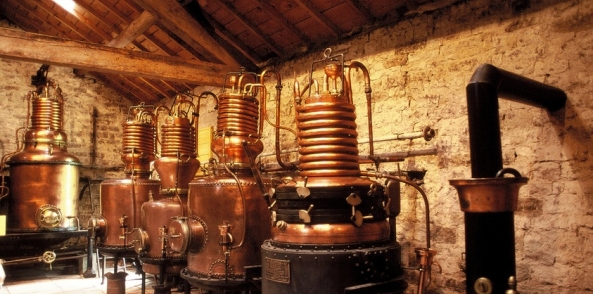The right yeast strain to make your spirit beverage unique
By Denise Jones, Technical Sales Support Manager, Fermentis
If it converts starch into sugar, any yeast can theoretically be used to make a wash that will become distillable alcohol. Variations in yeast strains produce varied metabolic bi-products which translate into different congeners in the fermentation and final spirit post-maturation. Some distillers are trying different individual or combinations of yeasts, including Belgian ale yeasts, traditional American ale yeasts, or even Champagne yeasts to ferment their mashes. Individual fermentations can be distilled as a blend or be blended after being distilled individually. And then you have the variable of how the different yeast strains respond to different process conditions. Variable conditions of temperature, initial sugar concentration, inoculation rates, nutrition values and more, considered individually or in combinations, can significantly affect the behavior of some yeasts and consequently, their flavor profile.

Distillers play a crucial role in yeast strain development by selecting and successfully using strains that have been adapted to the products they want to manufacture. Yeast strains prove to be successful and reliable by distillers simply practicing their craft while continuing on their quest to manufacture a product that offers unique characteristics, including sensory values, fermentation speeds, efficiency in sugar conversion, and more.
Distilling yeasts do possess similarities to those commonly used for wine, beer and cider. But many of the distilling strains have properties that keep the fermentation progressing in the more stressful and challenging sugar substrates present in distillers mashes and musts. Distiller’s yeasts are more efficient in converting sugar into alcohol, meaning the final fermentation is faster and drier with fewer residual unfermented dextrins left over. These types of strains work at a higher temperature and ferment more quickly, typically within 72 hours versus a beer fermentation that can last up to 14 days. Additionally, yeasts that work quickly are advantageous to distilleries that look towards higher efficiency to maximize production and capacity within the shortest timeframe. Some strains address the need for greater heat tolerance, furfural tolerance, or the need to adhere to regulations regarding enzyme use. Genetic compositions allow these strains to ferment larger sugar molecules and increase congener development which translates into more desirable aromas and flavors in the final product.
For example to produce whiskey in Scotland, the use of enzymes is not allowed, so strains that can ferment complex sugars are required. Whiskey also requires an aging process in barrels and some specific congeners produced by yeasts. With rum, different types of cane sugar substrates are used ranging from exhausted molasses with a high non-fermentable solid content to juice directly extracted from the cane. They are different worlds in terms of substrates, requiring strains that resist specific conditions. In short, we cannot pretend that a strain selected for wine and that has evolved in that environment can efficiently ferment a rum or whiskey, or a strain used to ferment sugar cane juice to ferment properly exhausted molasses. But cross-functionality is often possible and encouraged as a very important tool for innovation.

Our distiller’s strains have been selected for their tendency to be robust in high-stress situations that can alter and restrain sugar metabolism of the cells. The distiller’s choice of strain can depend on different conditions related to heat development, fermentation substrate conditions, or desired production efficiencies. To meet these conditions, Fermentis yeasts are adaptable to various substrates under different conditions and can ferment in multiple mediums. In many cases, there can be two or three strains that offer the right characteristics to ferment a specific wash for a spirit. We also offer strains that demonstrate the ability to ferment just about any sugar they encounter. Having choices helps distillers by offering a wide range of possibilities when selecting a yeast for their unique facility and specific type of fermentable sugar substrate. Some distillers will use the same strain on many different products helping them streamline their protocol systems and manage their supply purchases.
Included in those strain choices are the SafSpirit™ and SafTeq™ lines. SafSpirit™ yeast strains are selected to give a range of choices for an array of different sugar substrates to help the distiller more easily reach their goals. SafTeq™ yeasts are primarily selected to ferment agave-based musts, which are very rich in fructose and can have greater amounts of furfural and saponin, both considered toxins and strong inhibitors of the fermentation process. Providing strains that tolerate these toxins help the distiller achieve complete fermentation of the agave sugars.
Fermentis offers a wide range of yeast strains for the distilled spirits world. Our yeast’s ease of use and directed capacity to ferment various sugar substrates give distillers many choices with regards to their fermentation challenges while keeping the process as simple as possible. Understanding that no facility or situation is the same offers Fermentis the opportunity to assist the distiller in finding the best yeast and protocol to reach their goals. Every distillery has different equipment and support services for fermentation, so each producer needs to first consider fermenter size, shape, cooling capacity, desired alcohol targets, intended flavors and desired aroma. Then, having a yeast supplier that can successfully assist you using these parameters ensures that your production expectations are met while saving time and money.
Many distillers come to us aware of their production capacities and are very absolute in what they want as far as fermentation goals. Others will have a general idea but are searching for the right product to develop new functionality and flavor ideals. And many, if not all, want to find a way to differentiate their product from others by choosing a strain and protocol that develops uniqueness. All of these methods are successful and can result in a product that is significantly different from other market offerings.
Fermentis will always be there to offer help, advice and information to steer a distillery towards a successful product delivery. We are finding that many fermentations still won’t have the complete nutrition needed to have proper growth and metabolism. Finding the yeast strains and derivatives that work well with nutritionally deficient sugar substrates seems to be a general need within the industry. Fermentis has taken a lead in the production of yeast-derived products that enhance those sugar substrates lacking the necessary nutrients needed for optimal yeast performance. Then once a distiller becomes accomplished in fermentation, they’ll usually begin to consider flavors and aromas. The aroma of spirits consists of several hundreds of flavor active compounds produced at every stage of the process, but the majority of these substances are yeast metabolites produced during the fermentation process. Favorably enhancing the development of these metabolites seems to be the trend in spirit designed fermentations.
Fermentis adds incredible value to each of our customer’s fermentation needs by consistently providing our technical and sales managers with the latest research information from our France-based Research & Development facility, including intuitive conclusions and details about each strain within a variety of different fermentation situations. With this information, distillers can make the right choices in yeast strains to reach their fermentation goals.